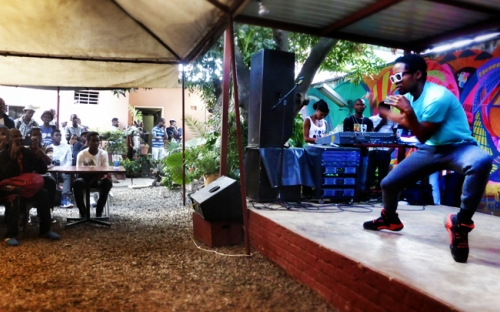Culturally Appropriate or Tackling Culture? HIV/AIDS Education in Zimbabwe
Have we achieved the aim to become more culturally appropriate? This was the question on the tip of my tongue as I headed to Zimbabwe for my Master’s research. Since the advent of HIV and AIDS in the eighties, the international community has been trying to spread awareness about the virus and its impact, particularly in Afrika where the impact has been the largest and hardest. Billions of dollars are spent each year by various United Nations agencies, philanthropists, and NGOs in a bid to combat HIV/AIDS. However, these international actors largely come in with their own agendas, indicators, or ideas on how to combat the virus in countries like Zimbabwe. Western biomedical conceptions of, and approaches to, disease are propagated in the belief that they are trans cultural models of reality.
Countries in Afrika are kaleidoscopically diverse in terms of culture not only between nations but within nations. Therefore, the cultural complexity of countries like Zimbabwe necessitates culturally complex responses to HIV/AIDS. The virus is not simply a biomedical phenomenon that occurs at the level of the individual, it transcends the individual, and is contracted and reproduced in an entangled mixture of social, economic, historic, geographic and cultural factors, especially in Afrika. Culture is simply one factor to consider when addressing the virus, but it is an important one. Why? Because culture gives identity and meaning to peoples’ lives as they enact cultural norms, values, epistemologies and practices communally. It often dictates how groups of people live, how they communicate, how they understand, and how they interact.
In more recent years, certain international and Afrikan actors have realised that biomedical approaches have not been sufficient in stemming the tide of HIV and have looked toward more holistic and innovative ways of spreading awareness. One of these more novel approaches to HIV/AIDS has been to put culture in the centre of the strategy in terms of both content and methods
of communication.
There are two ways ‘culture’ has become intertwined with strategies to reduce HIV/AIDS in southern Afrika. Firstly, cultural determinants of HIV/AIDS have been tackled in a bid to
curtail transmission.
For example, the HIV/AIDS community have identified certain southern Afrikan cultural practices that are deemed to spread HIV/AIDS, practices such as wife inheritance, widow cleansing, or polygamy. The practices have been titled ‘harmful’ or ‘negative’ in their capacity to contribute to the spread of HIV. The automatic response of those working in HIV/AIDS is to believe that if you arrest these practices, you will significantly
reduce transmission.
International and national actors call for polygamy to be replaced with monogamy; despite the reality that poly-fidelity is just as HIV protective as monogamy. One of the academic research respondents for my study explained her strong view on this matter. She felt that Feminists and Christians, who ideologically do not agree with polygamy, ‘Trojan horse’ their respective agendas in HIV education materials. This is despite the reality that polygamous relationships can protect themselves from the virus just as much as any monogamous couples could with the right tools and awareness. Whether you personally agree with polygamy or not, it is not an outsider’s right to judge people’s lifestyles.
Various actors also call for wife inheritance to be jettisoned without offering any replacement social mechanisms. Yes, wife inheritance can put women in a vulnerable position and can contribute to HIV transmission but it was created with a precise social purpose. Zimbabwean interviewees in my study told me that the practice was originally protective, aiming to maintain family continuity and women’s access to their deceased husband’s family resources. Therefore, simply telling those who practice this tradition to suddenly arrest it without any legitimate and agreeable alternatives and solutions may unravel complex social and cultural systems.
The second way culture has been incorporated into the HIV/AIDS response is to tailor prevention messages to the culture of the project recipients. Projects that are culturally integrated, relevant, sensitive, and acceptable are referred to as ‘culturally appropriate’ interventions. For example, using local languages, traditional methods of communication or grounding messages in cultural values and norms are recognised as culturally appropriate approaches to information dissemination. Importantly, using performing arts, such as theatre, poetry or music, to convey HIV messages is also deemed to be culturally appropriate, particularly in the Zimbabwean context. Certain local people who work in this realm told me that Zimbabweans are ‘talking’ and ‘performing’ people not ‘writing people’; therefore, dialogue and theatre would always be more effective than pamphlets and billboards.
While it may seem common sense that HIV messages should at least be in the local language, this has actually not been the case across most of the international HIV/AIDS responses in Afrika. The English ABC slogans (Abstain, Be faithful and Condomise) have been cut and pasted across Afrika despite English being the linguistic legacy of colonialism rather than a native language. It is important to note that simple translation of such messages will never suffice. One’s native tongue is semantically rich and nuanced compared to the meaning someone can extract from a lingua franca or a second language. Moreover, the actual content of the ABC slogan is questionable and seriously inadequate in various Afrikan contexts.
So we have two ways that culture has become central to HIV prevention strategies. On one hand, there are the interventions that tackle perceived cultural determinants of HIV/AIDS, such as wife inheritance. On the other hand there are projects that aim to ensure their content and approach is culturally appropriate. Sometimes there are projects that aim to do both. Unfortunately, some people mistake tackling such cultural determinants as being a culturally appropriate approach in itself. Tackling only ‘harmful’ and ‘negative’ practices such as wife inheritance or polygamy can never be culturally appropriate. Telling people their ‘traditional practices are bad and need to be stopped’ can never be culturally appropriate.
Yes, people need to understand where HIV transmission can occur in their social and cultural norms and practices but they should never be told to just arrest these traditions. Once people identify transmission nexuses, outsiders can be useful in providing the tools and support for project recipients to create their own solutions that fit within their own value and epistemological constellations. I ask you now, what is culture to you? Think about it for a moment. Ponder the definition you would give if someone randomly asked you what ‘culture’ is. It is a process that most of us do not undertake consciously or one that we take for granted. We use the word almost daily across various contexts, whether in referring to culture as the arts, socioeconomic and value systems, or as the unifying common characteristics of groups or entities (e.g. sports culture or corporate culture). So I ask you again, what is culture to you?
Interestingly, almost everyone I spoke to for my project defined culture as ‘a way of life’, whether they were Zimbabwean, non-Zimbabwean, working for the United Nations or working in community-based initiatives. People defined it rather consistently regardless of their background or experiences. Other common components added to this consistent core were that culture ‘defines us’ and ‘it makes us what we are’. There was also a strong emphasis on the fluidity of culture, the ability for cultural norms and characteristics to morph and contour with time and influence.
As we see, culture gives meaning to peoples’ lives. It gives people identity. While a lot of outsiders come with good intentions to combat the AIDS pandemic, we need to question our actions and value judgements every step of the way. We are entering another’s territory and we must tread with respect. Granted, certain practices should not be preserved at the expense of women’s and children’s rights and freedoms but it is not an outsider’s right to point to which practices should or should not be preserved. Only Zimbabweans can know best how to address their own issues and construct their own solutions. The answers lie within each and every one of you. So I call on Zimbabweans to find these solutions to their HIV/AIDS epidemic and not be tempted to follow outsider’s proposals simply because they have power, influence, and money propping them up. Only then can HIV/AIDS prevention strategies become
culturally appropriate.





